“No water, no sex”: An interview with Veit Helmer, director of film Absurdistan
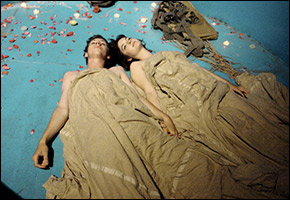
During an interview with Circle of Blue, German director Veit Helmer discusses his recently released film, Absurdistan. The film, which Helmer also co-wrote and produced, is his third feature. A race against time and a battle between the sexes, Absurdistan takes a humorous look at how water shortages impact culture, gender, and daily life. The film screened at the Grand Traverse Film Festival in July, 2008.
Tell us about the personal journey that led you to make Absurdistan.
Several years ago, I read in a newspaper a short clip about the village in Turkey where the women went on strike. In a village, near Antalya, there was a problem with the water pipe. So the women told their husbands as long as there is no water, there is no sex. I was immediately inspired to make a movie out of that story. I also went to Turkey to that village to research. Together with Serbian screenwriter Gordan Mihic, I developed the screenplay for the film.
In the film Absurdistan a young couple is trying to have sex but because of the sex strike they have a big problem. They need to solve the problem of their village. As they are very young, the grandmother ask them to wait four years. And exactly four years later, after they have waited, the strike starts. The young man develops a very original way to get the water back to the village. Absurdistan is a film which has very little dialog. It’s a very visual film. It was shot in Azerbaijan. The title refers to the magic environment I created. So the film is not really set in one specific country. It’s a rather universal film.
How did the geographic context you chose impact the way you portrayed the intersections between gender and water?
In the beginning I was looking for a village set in the desert. In the end I decided to shoot the film in two different villages, which I combined on the editing table to create the one and perfect village. There was one village I shot that was in the mountains: the village of Lahic, where we shot all the interiors and streets. And there was another village. The name is Chaicaragojuno — near Seki — which we used for distance shots.
In the beginning I was not interested to make a film about the real Azerbaijan today. But the longer we spent time in the Caucasus, we discovered there were more connections than just the location between the story of Absurdistan and the country where we shot the film. Many of the men in the Caucasus do not work as much as the women, as their wives. Many men spend their day in the coffeehouses. And the women not only take care of the household, they also do the work in the fields.
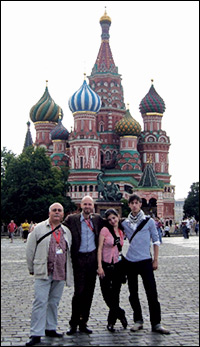
Photo courtesy of Veit Helmer
The cast of Absurdistan at the 2008 Moscow International Film Festival
What does the storyline, the narrative that you chose, say about water politics in the Caucasus?
Water is a commodity which is rare in more and more countries, which creates problems. In the village where the original strike happened, in Turkey, the women had a very crazy idea to overcome the water problem. I was fascinated in treating such a serious topic with a very light comedy approach.
What role might films like Absurdistan play in helping people who view the film to understand and respond to the complex social and political challenges that they face in their everyday lives?
Films that try to educate from the first minute are somehow viewed skeptically by the audience. In my film, from the first moment, I try to entertain the audience. And then on the second moment I try also to raise awareness about the issues, about water or gender problems. I think this is more effective than having the raised finger on the screen.
Are there other connections between Absurdistan, your journey to it, and water politics?
When we were shooting in the village of Lahic, we asked the people to install showers in their houses so my crew could sleep in the village. After the installation of the showers, the location itself started to have a water problem and the mayor asked me to apologize. So that was a very funny example of how reality catches up with fiction.
What do you hope for the audience to walk away with after seeing Absurdistan?
I hope that the movie will stay in the imagination of the audience. I am not making a film which is easily digested. My films demand more from the audience than the average film, where everything is said by words and dialogue. In my films the audience can more deeply participate, because the experience of watching a film without dialogue is a more challenging one. Compared to fast food it’s slow film.
Can you talk a little bit about the powers and challenges of producing a film, like Absurdistan, that doesn’t have a lot of dialog?
I can only say positive things. Once I was able to secure the financing, the production was one of the most beautiful experiences in my life. Together with actors from 16 different countries, I was traveling to Azerbaijan to make the film. There was the saying of Roberto Rossellini, who said making films can teach you that people from all over the world can be friends. And that exactly happened on my shooting. In the war-shaken region of the Caucasus, we were a real example of people from different natures, nations and cultures, living together in a very beautiful harmony.
Are there any stories about during the production anybody on your crew or cast overcoming what were conflicts or challenges through the making of the film?
In the village we didn’t have so much entertainment. So actually my crew did not really respect the subject of a sex strike. There were more than seventeen couples between my crew and my actors. And so far two marriages happened. I met so far two children being born between those couples. They for me are the first, the two real citizens of Absurdistan.
Interview by Sarah Haughn and Aaron Jaffe for Circle of Blue, July 30, 2008

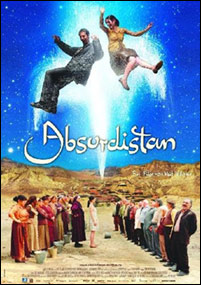
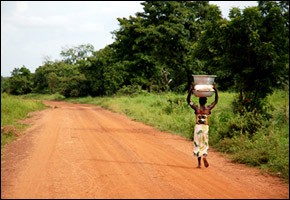
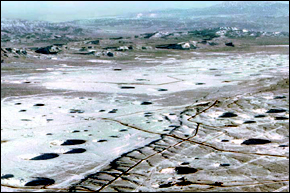
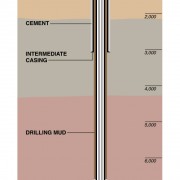
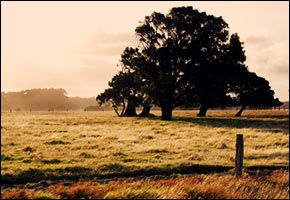

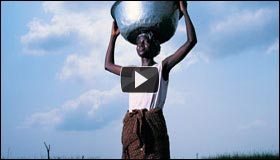

dear viet, how do you find this settlement full of water to be the place of no water no sex. this is really absurd. i understand that you were delighted by the settlement itself but
greetings vesna
good look